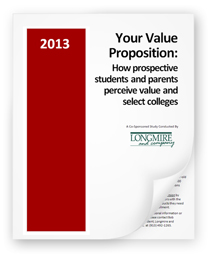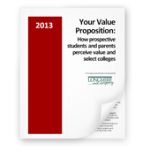
Talk about a surprise. We had just concluded data collection and were beginning the analysis on Longmire and Company’s latest national co-sponsored study. This one dealt with “the value proposition” and examined how prospective students and parents form their value perceptions and select colleges in the current economy. In the study, we were interested in quantifying the value that students and parents attach to higher education in general and, more specifically, to the colleges they were most seriously considering for Fall 2013.
Based on the rising cost of higher education, the increasing frequency of media reports on the topic, and the discussions of industry insiders, we expected the data to show that a paradigm shift had indeed taken place and that “outcomes” would be revealed as a primary driver of college selection. Not so.
The data revealed that students and parents are selecting colleges in much the same way as they have in the past. They are most concerned about what life will be like when they step on campus on the first day of the first semester. At that point, they are much less concerned about what their life will look like four, five, or six years down the road. In truth, many students enter college having no clue about what to study. And among those who do a sizable percentage will change majors at least once during their time in college. The study revealed that less than one-third of students enrolling in the Fall of 2013 said that the expectation of salary after graduation played an extremely important role in their college selection decision.
So, what do students and parents value most when selecting a college? The study did a deep dive on this. It’s critical to recognize from the outset that the determination of value is highly personal. A commonly held belief founded on much research and testing suggests that people arrive at a perception of value through a mix of three components: the perception of the quality of the product or service, the cost to own it and its return, and the excitement about having and using it. The weight of each component is inherently equal and changed only when put through the blender of the human decision-making process. Taken together, these three components add up to a total value perception. We believe this process of value perception formation and decision-making applies perfectly to higher education.
A thorough analysis of the data from this study (over 7,400 responses were collected nationwide) shows that an overall value perception score has a strong positive correlation to likelihood of enrollment. So does each component by itself. That’s not shocking. What we found most interesting is that the student’s excitement about attending the college is much more strongly correlated to likelihood of enrollment (by a factor of two) than is cost or perceived quality of the institution.
The study found that approximately 70% of parents and students bound for four-year colleges say they would reconsider a college that they initially believed to be too expensive if it could demonstrate greater value. When asked to specify in their own words the added value that would be required to mitigate the additional cost, most suggested added values that had nothing to do with money.
No doubt, the cost of higher education has risen dramatically for more than a decade. It seems logical that colleges would attempt to soften the public and political criticism by more effectively communicating value delivery. Unfortunately, this is not happening. Most importantly, it is not happening in the conversations between colleges and the students they are attempting to recruit. Only about 20% of students and parents recall having any conversation in which the college they were most seriously considering explicitly addressed how the college planned to maximize their time and investment as a student there. Just one-half of students and parents indicated that they were “very confident” that the money they will spend the first year of college will be worth it.
We will address the findings and implications from this national study of value and value perception in upcoming blog posts.
 To download “The Value Proposition” report or copies of our previous national co-sponsored studies, click here.
To download “The Value Proposition” report or copies of our previous national co-sponsored studies, click here.

